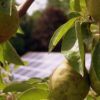Friends, We find ourselves immersed in another dark pandemic winter, a reality we could not have fathomed two years ago. And as the pandemic drags on, our social fabric continues to fray, while the climate crisis continues unabated. Then, into this moment comes the Texas synagogue hostage incident, thankfully unfolding without any hostage injuries or deaths, yet still traumatic for all involved, and for Jewish communities – and our allies – everywhere. It is difficult to avoid feeling overwhelmed and exhausted amidst times like these. Last night, we held an online event with hundreds of people from across the country, entitled We Are One: An Environmental Justice Tu B’Shvat Seder, honoring Tu B’Shvat– the New Year for the Trees – and Martin Luther King Jr Day, our American prophet of racial justice, civil rights, and nonviolent civil disobedience. During our seder, Janna Siller, Adamah Farm Director & Advocacy Coordinator, spoke of Tu B’Shvat as a deep accounting of our relationship with the Trees and with the Earth. MLK Day presents a similar obligation, to undertake a deep accounting of our society. Such an accounting is called cheshbon hanefesh in Hebrew, an accounting of the soul. Tu B’Shvat demands a new year’s accounting […]












